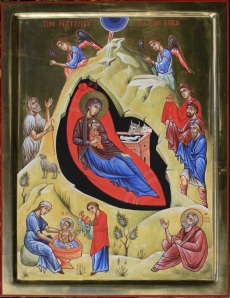When Monks Return from a Journey
Last week as I sat in Terminal 5 at LAX, waiting for a connecting flight to Sacramento, I was startled by a phone call — from a number in Los Angeles, no less. How in the world could anyone possibly know I was in town, and for only an hour at that?
It turned out to be from Chuck, who was with the baggage department downstairs. He had called to ask where, by chance, I might be going. He needed to know, because the luggage tag had fallen off my bag somewhere between Detroit and Los Angeles. What he failed to mention was that the handle to which the tag was attached had also “fallen off” somewhere. But that was a surprise to savor later.
I thought that might be the perfect lead-in to a reflection on Saint Benedict’s teaching on “When a monk returns from a journey.” What better tale of woe than another piece of luggage mangled? Well, a much better story awaited.
Fr. James has recently returned from a journey as well, though his was considerably longer than mine. For upwards of fifty years he had served in priestly ministry away from the Abbey, and last fall he moved home to retire.
A lot can happen in fifty years, and Fr. James was no longer the energetic man that many of the senior monks remembered. Nor were we, I suppose. For the few monks who live alone in pastoral assignments, the trasition back into the monastery can be daunting. That homecoming entails the loss of independence, particularly when it means turning in the car keys. They also discover that the monastery to which they have returned is no longer quite like the one they entered decades earlier. Long-time friends have passed away or moved into the Retirement Center, while fresh but unfamiliar faces are there to greet them. Even the abbot has become a youngster, by comparison. All in all, everyone has to adjust a little bit.
With his earnest and sweet disposition, re-entry for Fr. James has been easy in many respects. But his hearing aid has had a rough time of it, and it has screamed out at the most inopportune moments — like during the chanting of the Psalms. We’ve been through this before, and we tend to take it in stride. There are always many smiles around the choir when it does happen. But I’ve always wondered why no avant-garde composer has ever taken advantage of this. Why not write a concerto for strings and alto hearing aid, or a chamber piece for piano, hearing aid and two cell phones? But that’s another story.
Wanting to be useful, Fr. James signed up to read at table, likely for the first time in fifty years. Last Thursday at dinner he picked up Bill Brysen’s Walk through the Woods, which we’ve toiled at for weeks. In his deeply melodious voice he read slowly and very dramatically, almost poetically. Unfortunately, it was clear that he did not realize that this book was supposed to be funny. Pretty soon we were paying no heed to the book, because Fr. James had unintentionally stolen the show. And we thoroughly enjoyed it.
Friday evening Fr. James resumed his place at the reader’s stand, and to our unbelieving ears he repeated the very same pages from the evening before. He tripped over the very same long words, and once more he turned Brysen’s humor into a solemn narrative. It was a real tour de force, like an actor in a play, back by popular demand. He had us under his spell, and it was one of the most entertaining readings we’d heard in years.
After dinner one of the monks gently broke the news to Fr. James. To his credit, Fr. James took it well, though he was astonished that he could do such a thing. And for the rest of us, the good news was two-fold: both Fr. James and we had grown in mutual charity, and we weren’t going to have to listen to that passage a third time.
In his Rule Saint Benedict asks the monks to pray daily for confreres who are away on a journey. One obvious aim is that the monk be safe, and a second is that the journey be a success. Equally important, I think, is the hope that after fifty years a monk won’t return home crazy, only to find that his confreres had become impossible to live with while he was gone.
Actually, that’s not such a bad prayer for anyone — be they spouses or friends. Happily, in the case of Fr. James and us monks, our prayers have been answered. At least for now. And that’s why we will pray again tomorrow.
Monastery notes
On January 28th we celebrated the feast of Saint Thomas Aquinas. Fr. Mark presided at the Eucharist, and his homily began with a bit of wisdom that we all accept: people enter the monastery for one reason, but stay for another. And the reasons for remaining evolve as we mature. That, of course, is the secret to the success of any relationship, marriage included. If you married someone because they were young and lovely at twenty-one, for example, it might be good to find some other qualities in your spouse for they day when they reach the ripe old age of twenty-two.
Fr. Mark then went on to point out what many don’t realize: Thomas Aquinas was not called to be a Benedictine at Monte Cassino, but his parents likely were. They were the ones who brought him to the monastery’s school when he was five, and they expected that he would eventually become a monk, and in time the abbot. His uncle was already the abbot, and in the days of nobility young Thomas could reasonably expect to succeed to that office.
 But in the course of his education Thomas discovered that the monastery was not the place for him. Against the wishes of his parents, he entered an upstart group called the Dominicans, and thus began a career in which Thomas developed as one of the leading intellects of Europe.
But in the course of his education Thomas discovered that the monastery was not the place for him. Against the wishes of his parents, he entered an upstart group called the Dominicans, and thus began a career in which Thomas developed as one of the leading intellects of Europe.
What particularly caught Thomas’ imagination was Aristotle and the Arab and Jewish scholars who studied that pagan Greek philosopher. In the thirteenth century scholasticism had begun to draw the leading Christian minds in the West, much to the dismay of monastic circles. For a thousand years patristic theology had held sway in both the Orthodox East and the Latin West, and no more so than in Benedictine monasteries. It was a wisdom tradition, and it relied for its inspiration on the writers of the early Church. The rational approach of the scholastics seemed to them to destroy the mystery of God. But even worse, in an age that revered tradition, scholasticism was new. Doing anything new was enough to get you into a lot of trouble.
 Had Thomas remained at Monte Cassino, he likely would have enjoyed a successful career as abbot. But the odds of becoming Europe’s leading theologian were slim. The Dominicans had stolen the theological thunder of the monks, and Thomas blossomed in that intellectual environment.
Had Thomas remained at Monte Cassino, he likely would have enjoyed a successful career as abbot. But the odds of becoming Europe’s leading theologian were slim. The Dominicans had stolen the theological thunder of the monks, and Thomas blossomed in that intellectual environment.
There’s no record as to whether the monks at Monte Cassino were sorry to see Thomas go. His parents were certainly upset; but it wasn’t their life, and it wasn’t their vocation. Thomas flourished, however, and today we revere him as a doctor of the Church.








